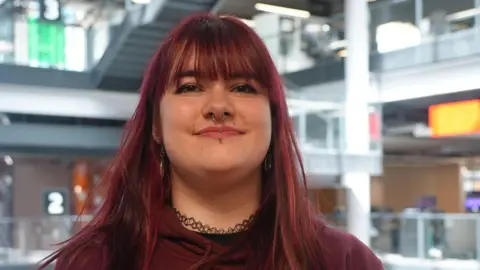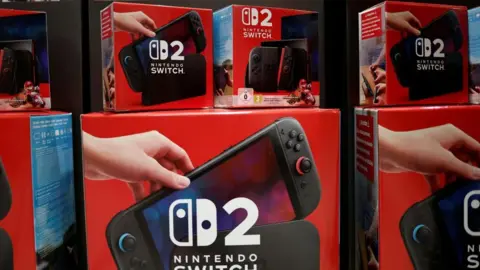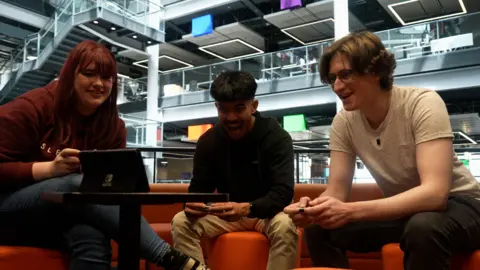BBC Wales News
 BBC
BBCKady Sands, 21, started playing video games at three years old – passing the controller back and forth with her Dad.
But she has gradually noticed that games are taking up more of her disposable income.
She said the price point had “slowly climbed up over the years” and, with some games now costing more than £70, “it isn’t affordable anymore”.
For Kady, games are more than just a hobby – she also uses them to drown out the noises of city life.
“Sometimes I do get sensitive in public places,” she said. “So having a portable console to focus on really helps with that.”
The Nintendo Switch 2, a hybrid portable games console which also plugs into your TV, has sold more than 3.5 million units since its launch earlier this month.
This is despite widespread debate among gamers about the £395.99 price of the machine and some of its games, such as Mario Kart World, which costs £74.99 for a physical copy.
There was also a bundle deal where the console and Mario Kart World was £429.99.
But Nintendo is by no means the only games company pushing its prices upwards.
Microsoft announced in May that its Xbox series X consoles were going up by £50 to £299.99, while the Sony PS5 increased by £40 to £429.99.
 Reuters
ReutersWith the extra content that comes with many new games, Kady, who works as a bartender, said big new releases could cost the same as what she makes in a shift.
She said she had changed her gaming habits to keep costs down, looking for alternatives to the newest releases from big game developers.
Kady said smaller ‘Indie’ titles gave her the “same amount of enjoyment” but were “much cheaper”.
“I’ve sort of gone from thinking about these, like, triple-A games as the be all and end all,” she added.
Nick Poole, CEO of UK Interactive Entertainment, which represents more than 2000 games businesses in the UK, said game developers were “always looking at ways to manage the cost of production”, which he said was “significantly higher than 10 years ago”.
This is because of “really high fidelity graphics” in games needing “a lot of people involved in the development process”, he explained.
 PA
PA“We have to acknowledge that the cost of building those really rich experiences is going up and up,” Nick added.
Despite this, he said that games still compared well to other forms of entertainment in terms of price.
In the cinema “you’re paying £15 to £20 for a three hour experience”, he said, but you might pay three times as much for “hundreds of hours of really immersive gameplay”.
‘Things aren’t necessarily improving’
For aspiring professional gamer and online streamer Dirk Casinillo, videogames have been a “coping mechanism”.
He grew up in the Philippines and the UK but now lives in Llanelli, and said “moving around a lot and the fact that I was alone a lot as a kid” meant that he had built “lifelong relationships” through the competitive games he plays.
But the 22-year-old has noticed significant price increases for the latest flagship titles.
“It’s almost as if things aren’t necessarily improving,” he said. “They’re just becoming more expensive.”
 Dirk Casinillo
Dirk CasinilloWhile Dirk prefers to master his skills on a few games rather than buying lots of new ones, he recalled how £40 used to be “considered expensive for a game back in the day”, while now games could be “in excess of £75”.
‘It’s a very hesitant decision’
While gamers regret price rises for their favourite pastime, many appreciate the hard work that goes into making the games they love.
“People overlook the amount of things you need to do” to develop a game, said Nicholas Mayers, who hopes to design his own in the future.
“The sound, like everything! Movies almost look small by comparison.”
Nicholas described himself as “very passionate” about games, which he said he used as an escape.
He said when he was immersed in gaming he did not “need to worry about a lot of the stuff that goes on in real life”.
 BBC News
BBC NewsDespite how important they are to him, Nicholas admitted that buying new games had become “a very hesitant decision” as it’s become “quite unaffordable for a lot of people”.
He said he would “play the same games over and over” while he saves up his money to afford new ones, even attempting to save on food costs to prioritise games.
“I’ll try my best to budget and buy as much stuff in bulk as possible,” he added.
Nicholas is not alone in making sacrifices to keep on playing.
According to Kady, who has gathered opinions in Cardiff Metropolitan University’s gaming society, many people are foregoing social activities to afford new game purchases and subscriptions.
“Lots of people have said they don’t go on nights out or in-person social events,” she said.
“They would like to do both, but with the rising cost of games, you can’t have your cake and eat it.”






